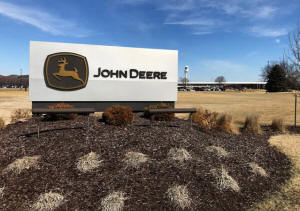|
Democrats target union workers who regret
Trump vote
 Send a link to a friend
Send a link to a friend
 [May 04, 2018]
By Tim Reid and Joseph Ax [May 04, 2018]
By Tim Reid and Joseph Ax
DUBUQUE, Iowa (Reuters) - Inside Knicker’s
Saloon, a factory worker hangout here, Jesse Oberbroeckling has just
finished his shift at the John Deere plant when he reveals his regret.
Like many union workers, Oberbroeckling voted twice for former
Democratic President Barack Obama before backing Donald Trump and other
Republicans in 2016.
Now he has buyer's remorse - and plans to support the Democratic
challenger to Rod Blum, the Republican congressman in this blue-collar,
eastern Iowa district.
"Trump is for the rich," said Oberbroeckling, 37, sipping a
rum-and-coke. "Blum's for big business. They said they were for the
workers, but they're not."
That sentiment should encourage Democrats, who saw their once-reliable
labor vote help send Trump to the White House after he vowed to revive
Rust Belt factories with trade tariffs and ailing coal mines with
environmental deregulation. Now - with coal still struggling and Trump
stoking a trade war - many union workers have soured on the president
ahead of November’s midterm congressional elections, the Reuters/Ipsos
opinion poll shows.
Between March 2017 and March 2018, union members' approval of Trump fell
15 points, to 47 percent. In more than two dozen interviews with union
members, many blasted Trump’s tax cut, arguing most of the benefits will
flow to corporations and wealthy people.

A loose coalition of union leaders, Democratic strategists and political
action committees (PACs) aims to seize on that shift by directing money
and campaign workers to about 30 competitive races union-heavy
districts. The party needs to gain 23 seats to retake the U.S. House of
Representatives.
But falling support for Trump is no guarantee Democrats can restore the
party’s historic dominance of the union vote. Nearly half of members
polled still approve of the president, and their support for
congressional Democrats has declined slightly from two years ago.
Forty-seven percent of union members polled would support a Democratic
candidate in November; 34 percent favored a Republican. That compares to
51 percent favoring Democrats and 29 percent supporting Republicans in
March 2016.
The 2018 poll was conducted online, in English, and included more than
1,400 union workers nationwide. It has a credibility interval of 3
percentage points, meaning results could vary in either direction by
that amount.
Union membership has fallen by half since the early 1980s, to 10.7
percent of U.S. workers last year. But members can still sway close
elections because they are concentrated in specific regions and vote at
high rates. In the 2014 midterms, 52 percent of union workers voted,
compared to 39 percent of others, according to a study by Demos, a
liberal think tank.
"If we don't win them back, we will never win here," said Abby
Finkenauer, the leading Democrat challenging Blum in Iowa's 1st
District.
Blum's campaign did not respond to requests for comment.

TARGETING FARM, FACTORY TOWNS
Democratic strategists are targeting blue-collar enclaves of the
Midwest, along with districts covering California farmlands, New York
industry towns and Montana wilderness. They aim to trash the Republican
tax cut, along with Trump's failure to back a minimum wage and his
attempt to repeal Obamacare.
In Iowa's 1st District, dotted with farms and factories, Finkenauer
tells audiences at union halls that her father was a union
pipefitter-welder and that only a Democrat can improve their wages,
health care and pensions.
Blum's website says lower taxes and cutting business regulation will
create jobs.
Ford O’Connell - a Republican strategist who was among the first to
highlight how voter anger could propel Trump’s candidacy - said the
party will appeal to union voters with his tariffs against China,
anti-immigration efforts and the tax cut they argue helps all workers.
Democrats counter they are already recapturing labor votes, citing the
March special election victory in Pennsylvania by Conor Lamb, who beat
an outspoken opponent of unions. Trump won the same district in 2016.
Following Lamb’s victory, the Democratic Congressional Campaign
Committee (DCCC) convened focus groups of voters who had supported both
Trump and Lamb. Participants wanted candidates who support unions, boost
jobs and wages and protect Medicare and Social Security.
In interviews with Reuters, union members criticized the tax cut, along
with Republican moves in some states - including Iowa - to curtail
collective bargaining by public employees. And while Trump’s tough trade
talk attracted many union workers to his campaign, some now worry his
policies may protect some blue-collar jobs at the expense of others.
Trump’s steel tariffs, for instance, could raise prices for the raw
material used in factories supporting union jobs.
[to top of second column]
|

A sign for the John Deere plant is pictured in Dubuque, Iowa, U.S.
March 29, 2018. Picture taken March 29. 2018. REUTERS/Tim Reid

Reuters/Ipsos polling data shows union workers now view Democrats
more favorably on key issues such as healthcare, the economy and
taxes.
Ken Jones, a retired mechanic and Teamster union member, backed
Trump because he believed Clinton was “crooked” - borrowing Trump’s
signature insult - and that Trump might curtail illegal immigration,
create jobs and fix Obamacare.
“Now I see he’s not going to do anything,” said Jones, of Oklahoma,
who plans to vote Democratic this fall. “The working man don’t get
nothing out of it. I never voted Republican until Trump, and it was
the worst mistake I ever made.”
Other union members, however, continued to praise Republicans.
“The economy is doing better," said Otis Evans, 47, of the United
Auto Workers in Michigan. "Trump’s straightforward and candid."
CAMPAIGN COLLAPSE
While union leaders backed Hillary Clinton for president, they
failed to deliver rank-and-file votes.
Clinton won 8 percent more of the union vote than Trump, according
to polling of union members by the American Federation of Labor and
Congress of Industrial Organizations (AFL-CIO).
That's 10 percent less than Obama won in 2012 and a drastic drop
from the more than 30-point advantage among union households that
her husband, President Bill Clinton, enjoyed in 1992. In interviews,
many union members cited a distrust of Hillary Clinton personally,
rather than her specific policies, as one reason they backed Trump.

Unions still overwhelmingly back Democrats financially. In 2016,
donations to state and national Democratic parties from several
major unions - United Steelworkers, United Auto Workers, Service
Employees International Union (SEIU), American Federation of State,
County and Municipal Employees (AFCSME), and the biggest unions in
the AFL-CIO - totaled more than $1.5 million, according to a Reuters
analysis of Federal Election Commission data.
Those unions donated nothing to Republicans that year, the analysis
showed.
This year, the AFL-CIO will deploy campaign workers and political
donations in 31 union-heavy congressional districts, along with a
wider array of races in 14 battleground states.
The organization has revamped how it gauges its political
effectiveness, said organizing director Julie Greene. In addition to
traditional measures like tracking phone calls and door knocks, it
will analyze qualitative data, such as the length and substance of
member-to-member conversations.
The DCCC is sending organizers to three dozen House districts, where
they are partnering with representatives of the two-million-member
SEIU to emphasize labor issues in those campaigns.
Guy Cecil, president of Priorities USA Action, a Democratic "super
PAC," said it will finance Democrats in seven states. It is the
first time the group, founded in 2011 to support Obama, has waded
into midterm elections.

All these efforts are designed to prevent a repeat of 2016, said
Steve Rosenthal, the AFL-CIO's former political director and now a
political consultant.
"There was a collapse of union support," he said.
(For graphic on Trump support among union voters, click:
https://tmsnrt.rs/2JSv3sW
(Reporting by Tim Reid in Dubuque, Iowa and Joseph Ax in New York;
Additional reporting by Chris Kahn and Grant Smith; Editing by
Colleen Jenkins and Brian Thevenot)
[© 2018 Thomson Reuters. All rights
reserved.]
Copyright 2018 Reuters. All rights reserved. This material may not be published,
broadcast, rewritten or redistributed.
Thompson Reuters is solely responsible for this content. |